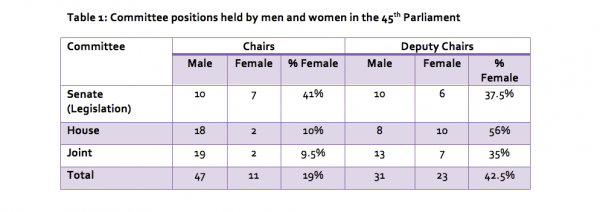Dear 46th Parliament,
I know you don’t technically exist yet, but your imminent arrival is greatly anticipated. Perhaps there will be a ‘handover’ of sorts between parliaments 45 and 46; perhaps there won’t. But just as Christmas gives children the opportunity to express their deepest desires, this election campaign gives me a moment to reflect on a few things I very much wish to see in a new parliament.
Let me start by being blunt: the 45th Parliament (your predecessor) could have done a lot more for its women members and, more broadly, for gender equality in Australia
Let me start by being blunt: the 45th Parliament (your predecessor) could have done a lot more for its women members and, more broadly, for gender equality in Australia.
In less than three years, we heard graphic reports of sexual harassment, bullying and intimidation against women both inside and outside the parliament; women from the frontbench on both sides of the chamber resigned because of the continuing challenge in balancing young families and political leadership; there was an almost scandalous scarcity of women in parliamentary leadership positions – no women presiding officers, no women leaders of the House (or Senate), three times more male than female party whips (3 out of 11, across both houses), and one in five committee chairs across both houses was a woman; and of the hundreds of parliamentary committee inquiries conducted in that time, only a handful were specifically related to gender equality (take a look yourself, by typing in the word ‘gender’ here).

Source: Notice Papers of the House of Representatives and Senate, available at www.aph.gov.au
The 45th Parliament did not create a space for women Members and Senators to come together and support each other. And it did not help all members look at the potential impact of the budget, policies and legislation from a gender perspective (what other parliaments around the world refer to as ‘gender mainstreaming’). To be fair, the Australian federal parliament has never really done that, but it’s time it did.
In fact, Parliament, you could take a leaf out of the book of a few other parliaments around the world, that do take gender equality a whole lot more seriously.
A few things spring to mind:
1) Policy and procedural changes to outlaw and address incidences of violence against women in parliament, including sexual harassment, bullying and intimidation
You could institute a code of conduct for Members and Senators that prohibits sexual harassment and violence against women parliamentarians, as is the case in New Zealand.
You could create a grievance process that allows for the raising and resolution of allegations, chaired on a rotation basis by an all-party committee.
You could remind MPs and staff of parliamentary policies, regulations and legislation on harassment and violence against women through regular newsletters or social media feeds, as the Belgian Parliament does.
2) Changes to parliamentary workplace practice
You could adjourn sittings after 6 or 7pm, as they do in Luxembourg or Peru. Or you could suspend divisions (votes) on Mondays until Tuesdays, to allow Members and Senators longer periods of time in their constituencies (and with their families), as the Swedes do.
And you could really make more of an effort to stamp out sexist and misogynistic language in the chamber. The German Parliament codified the use of gender-neutral language in all of its documents. But you could go further.
3) Rule changes to guarantee women’s leadership
You could require ‘gender balance’ (i.e. at least 40% either women or men) in the nomination lists of committee chairs or deputy chairs (and yes, this is what a female Speaker mandated in Uganda). You could also change the Standing Orders so that all speakership positions are alternated between women and men, as is done in Tunisia.
4) Procedural changes to mainstream gender equality in legislation and the budget
46th Parliament, there is a lot to do on gender mainstreaming. First of all you could pass legislation to establish legal and procedural gender mainstreaming mandates for parliament (some excellent examples are available in Belgium and Spain).
You could create a database through which the public can monitor the passage of gender-sensitive legislation and other gender equality events held in parliament (look no further than the Republic of Korea).
You could require specific committees to address gender issues in the national budget, including through public hearings (here, the Netherlands is your reference point).
You could, like your Commonwealth Counterpart in Canada, ensure all committee members have gender-analysis training.
And you could follow in Fijian footsteps and revise the standing orders to ensure all committees consider the gender equality implications of their work.

Statue of Emily Murphy, Parliament Hill Ottawa, Ontario, Canada. Image: Shutterstock
5) Mandating parliamentary bodies to monitor gender equality outcomes
Just like Westminster (UK), you could establish a Reference Group to develop and regularly monitor action plans, including the implementation of planned activities to promote gender equality.
Or you could emulate the Swedish Riksdag by attributing responsibility to a specific committee to oversee the gender mainstreaming work of the entire parliament.
6) Supporting the women who have made it into parliament
And finally, you could just seize the moment and support women working together in some kind of cross-party platform. That’s right, they have one in the UK, in Canada, in Finland and in another 80-odd parliamentary chambers around the world.
Dear 46th Parliament,
Sure, there’s a lot to do. But political will and a little bit of help will get you a long way.
Yours, very sincerely,
…




